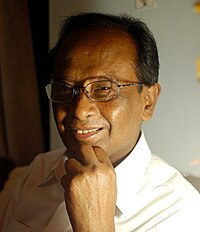Maloy Krishna Dhar
Thank you for being part of the Bharatpedia family! 0% transparency: ₹0 raised out of ₹100,000 (0 supporter) |
Maloy Krishna Dhar | |
|---|---|
 Maloy Krishna Dhar (2011) | |
| Former Joint Director of Intelligence Bureau | |
| Personal details | |
| Born | 13 July 1939 Bhairab-Mymensingh, East Bengal, British India (present day Bangladesh) |
| Died | 19 May 2012 (aged 72) Delhi, India |
| Nationality | Indian |
| Spouse(s) | Sunanda Dhar |
| Children | 2 |
| Alma mater | University of Calcutta |
| Profession | Spymaster |
Maloy Krishna Dhar (13 July 1939 – 19 May 2012) was an Indian intelligence officer and an author who served in the Intelligence Bureau, India's domestic intelligence agency.[1]
Early life and education[edit]
Dhar was born in Kamalpur, Bhairab-Mymensingh in East Bengal, and relocated to West Bengal with his family during the Partition of India. Following his completion of a Master's degree in Bengali Literature and Language and Comparative Literature from the University of Calcutta[2]
Career[edit]
He served from 1964–1968 in the West Bengal cadre of the Indian Police Service and, in 1968, was deputed to the Intelligence Bureau, where he spent the rest of his career.[3]
Throughout his extensive career, he held significant positions during important periods, such as the insurgency period in Manipur and Nagaland in the early 1970s.[4] He also played a role in Sikkim between 1975 and 1979, during its formal merging as a state.[5] Additionally, he was involved in handling sensitive operations related to counterintelligence and counterterrorism. From 1983–87, he was stationed in Canada, a time marked by the increasing rise of the Khalistan movement and the Kanishka Bombing.[6]
After reaching retirement age, he pursued a career as an independent writer and journalist, contributing articles to all the prominent English newspapers, specifically focusing on India's intelligence system.[7]
Death[edit]
Dhar unfortunately passed away on May 19, 2012, following a month-long struggle with deteriorating health. It began with a stroke and was further complicated by renal and multi-organ failure.[8]
Publications[edit]
- Bitter Harvest : A Saga of The Punjab (1996)
- Open Secrets: India's Intelligence Unveiled (2005)
- Fulcrum of Evil: ISI-CIA-Al Qaeda Nexus (2006)
- Black Thunder: Dark Nights of Terrorism in Punjab (2009)
- Train to India: Memories of Another Bengal (2009)
- We the People of India: A Story of Gangland Democracy (2010)
- Shakti: Real-life Stories Celebrating Women Power (2012)
- The Ghost Wars of Tepantar (2012)
References[edit]
- ↑ Shaffer, Ryan. "Indian Intelligence and the Mystery of Muhammad's Hair". International Journal of Intelligence and CounterIntelligence. 34 (1): 97–105. doi:10.1080/08850607.2020.1752565. ISSN 0885-0607.
- ↑ Ashrafi, Shah Tazrian. "The fires of Partition in East Bengal". The Daily Star. Retrieved 2023-07-17.
- ↑ Noorani, A. G. Dhar, Maloy Krishna (ed.). "Intelligence and the Political System". Economic and Political Weekly. 40 (13): 1330–1333. ISSN 0012-9976.
- ↑ Dhar, Mainak. "My Father Maloy - a diamond on Intelligence". Sri Lanka Guardian. Retrieved 2023-07-17.
- ↑ "If not for him, Sikkim wouldn't be a part of India". www.rediff.com. Retrieved 2023-07-17.
- ↑ Billore, Paridhi. "Book Review | Open Secrets: The Explosive Memoirs of an Indian Intelligence Officer – Center For Land Warfare Studies (CLAWS)". www.claws.in. Retrieved 2023-07-17.
- ↑ Shaffer, Ryan. "Decoding the Samba spy scandal:false spies, counterintelligence and military intelligence in India". Journal of Intelligence History. 21 (2): 191–212. doi:10.1080/16161262.2021.1882090. ISSN 1616-1262.
- ↑ "An intelligence officer who wielded the pen with equal ease". The Indian Express. Retrieved 2023-07-17.
